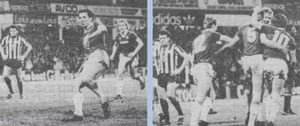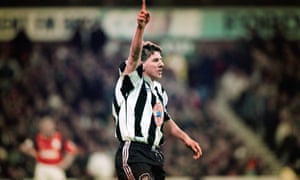[ad_1]
On 21 April 1986 West Ham welcomed Newcastle United for the 37th and, as it turned out, most memorable match of their greatest league campaign. They were fifth in the table but with genuine title pretentions, holding as they did between two and four games in hand on those above them, and had won six of their past eight matches.
Newcastle’s previous seven games had featured 30 goals at an average of 4.3 each and the Guardian’s chief football writer, David Lacey, in his report on their relatively dreary 1-1 draw at Chelsea two days earlier, had concluded that “if Newcastle’s defence repeats its sluggish performance West Ham should net a shoal of goals”. It was quite the prediction: at Upton Park, in a state of complete, injury-enforced disarray, they conceded eight.
The match is most commonly remembered for Alvin Martin’s hat-trick, the first of his career and the first scored in the league against three different goalkeepers, and for the exuberant attacking of a West Ham team that would eventually miss out on the title by four points (and a bit of goal difference). “It was,” Robert Armstrong wrote in the Guardian, “an extraordinary performance even by the high standards of skill, pace and finishing power the Hammers set themselves.” But as that hat-trick statistic suggests, it was a night of wild misfortune for the visitors. As the Hammers’ Newcastle-born assistant manager Mick McGiven put it after the match: “United should forget all about the result – I can hardly remember a team having so much bad luck in one game.”
Jeff Clarke, an ever-present all season at the heart of defence, was out with a knee injury; Glenn Roeder, who had recently recovered from food poisoning, scored an own goal and conceded a penalty; Chris Hedworth, a 21-year-old academy graduate whose five previous first-team appearances had come at centre-half or right-back, was crowbarred into midfield; John Anderson started in defence but because of a strained achilles and with the team’s one permitted substitution used up ended hobbling uselessly on the right wing, unable to do such basic activities as running and kicking.
In goal, at least at the start, was Martin Thomas, who had suffered a shoulder injury in training in early March and missed seven games before coming back and promptly injuring the shoulder again. Gary Kelly, his back-up, had only just had his plaster removed following a knee operation and Kelly’s replacement, David McKellar, who arrived on loan from Hibernian having not played a first-team game for nine months, had picked up hip and groin injuries in that draw at Chelsea, forcing Thomas to prematurely return. “Really there was no way I should have been playing but it was a case of having to because Dave found that the hip injury he had picked up at Chelsea had spread to his groin,” Thomas said. “He could hardly walk.”

Thomas’s fragile fitness lasted all of two minutes, when he “landed awkwardly and tore all the muscles in my shoulder”. Two minutes later Hedworth fouled Neil Orr, Alan Devonshire floated a free-kick into the area and Martin volleyed in. In the 11th minute Ray Stewart’s long-range drive went through Thomas’s hands, then a similar if more central effort from Orr did likewise. Roeder’s backheeled own goal made if 4-0 at the interval, which was when Thomas gave up.
Peter Beardsley, who would occasionally play in goal during training sessions, volunteered to replace him but the manager, Willie McFaul, refused to allow it. “I was not prepared to throw in the towel,” he said. “I wanted him to stay where he was because there was always a chance that he could have pulled a goal back for us.” Hedworth was chosen instead. “I haven’t played in goal since I was a schoolboy, but I had injured my knee early in the game and I felt I had no alternative to give it a go,” he said.
Ten minutes later he fractured a collarbone in a collision with Tony Cottee; he persevered for a while, but after Martin headed in a 64th-minute corner he also gave up. He moved to left midfield, forming with Anderson the game’s all-time least mobile pair of wingers. “It took guts to do what he did,” said McFaul. “How he carried on does not bear thinking about.” (Three weeks later, and without making another appearance, Hedworth was released on a free transfer.)
Ironically it was only after Beardsley finally went in goal that Newcastle pulled a goal back, through Billy Whitehurst. It took until the 81st minute for West Ham to score their sixth, but the seventh came within two minutes and then the referee, Bob Hamer, spotted a handball from Roeder a few seconds after the restart. Stewart was the team’s official penalty taker, but Martin insisted he get a chance to complete his hat-trick.
“I got a rollicking from [the manager] John Lyall when we got back into the dressing-room,” he later said. “I’d never taken a penalty before. In fact, it was the only one I ever took in my career … I have to say, Peter did not fill me with fear as he stood there. I stared at the bottom left corner and stared again. He thought I was bluffing but that’s where I put it. He dived the wrong way.”

The match ended with West Ham’s fans serenading Beardsley with chants of “England’s No 1”, while Newcastle’s own supporters refused to let the scoreline deter them from celebrating an impressively gutsy if wildly unfortunate display. “All the lads had a go and in the circumstances I just wished we had kept it to five,” concluded McFaul.
For one visiting player the discomfort did not end with the final whistle: England were due to play Scotland at Wembley two days later, and Beardsley had arranged to stay with a friend in London in case Bobby Robson decided to call on him. With hindsight, however, he would probably have asked someone other than Alvin Martin.
[ad_2]
Source link